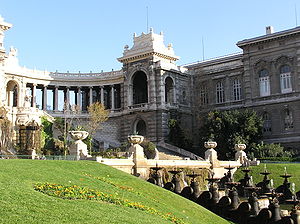
Muséum d’histoire naturelle de Marseille
Encyclopedia

Marseille
Marseille , known in antiquity as Massalia , is the second largest city in France, after Paris, with a population of 852,395 within its administrative limits on a land area of . The urban area of Marseille extends beyond the city limits with a population of over 1,420,000 on an area of...
was founded in 1819 by Jean-Baptiste, marquis de Montgrand
The museum houses 83,000 zoological specimens d'animaux, 200, 000 botanical specimens, 81,000 fossils , and 8,000 mineral specimens.
The four exhibitions areas are
- la salle Safari -World FaunaFaunaFauna or faunæ is all of the animal life of any particular region or time. The corresponding term for plants is flora.Zoologists and paleontologists use fauna to refer to a typical collection of animals found in a specific time or place, e.g. the "Sonoran Desert fauna" or the "Burgess shale fauna"...
- section concentrating on accidental imports through the port. - la salle de Provence-Regional Fauna and FloraFloraFlora is the plant life occurring in a particular region or time, generally the naturally occurring or indigenous—native plant life. The corresponding term for animals is fauna.-Etymology:...
- la salle d'ostéologie- Comparative AnatomyComparative anatomyComparative anatomy is the study of similarities and differences in the anatomy of organisms. It is closely related to evolutionary biology and phylogeny .-Description:...
- la salle de préhistoire, sur l'évolution- PrehistoryPrehistoryPrehistory is the span of time before recorded history. Prehistory can refer to the period of human existence before the availability of those written records with which recorded history begins. More broadly, it refers to all the time preceding human existence and the invention of writing...
and EvolutionEvolutionEvolution is any change across successive generations in the heritable characteristics of biological populations. Evolutionary processes give rise to diversity at every level of biological organisation, including species, individual organisms and molecules such as DNA and proteins.Life on Earth...
.
The museum organises conferences and temporary exhibitions.
History-One of the museums directors was Antoine Fortuné Marion
Antoine Fortuné Marion
Antoine Fortuné Marion was a French naturalist with interests in geology, zoology, and botany.A school friend of Paul Cézanne's in Aix, Antoine Fortuné Marion went on to become professor and director of the Natural History Museum in Marseille...
(1846–1900).
The address is
Muséum d’histoire naturelle de Marseille
Palais Longchamp (aile droite)
13004 Marseille
Tél. : 04 91 14 59 50
Fax. : 04 91 14 59 51
External links
- Site internet museum-marseille.org
- La page du museum sur le site de la mairie (town hall)

